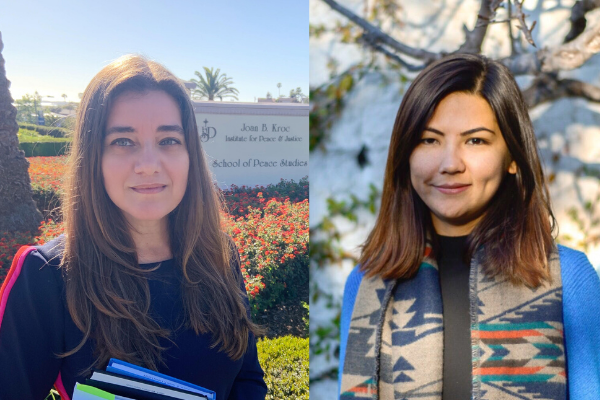Transnational Problems Require Multilateral Action

The following contribution is by Veronica Musa (left), an international human rights lawyer from Argentina, and Nasema Zeerak (right), an independent conflict researcher with the focus on human rights from Afghanistan. They are an alumna and a graduate student, respectively, from the Joan B. Kroc School of Peace Studies of the University of San Diego.
Isolationism has not worked in previous global crises, and it is not likely to work in the current pandemic. As the world confronts a global public health crisis, we hear voices that call for stronger international cooperation, and voices attacking the international system as ineffective to stop or contain a problem of this magnitude. Being Peace scholars from two far corners of the world, Argentina and Afghanistan, we are particularly aware of the importance of multilateralism and the need to strengthen global governance institutions.
President Donald Trump's June 6 letter to the U.N. announcing the U.S. withdrawal from the World Health Organization (WHO) on allegations of the agency's mismanagement and covering up of the spread of the coronavirus, aims at the heart of the U.N. This announcement follows his recent decision to halt WHO's funding unless reforms are made, compromising 15% of the agency's budget. Whether the withdrawal decision is a whitewash of the President's domestic mishandling of the crisis, as some critics have advanced, or a legitimate concern about the agency's faulty operations, the U.S. withdrawal from the WHO is a blow to the system of international cooperation created in the aftermath of World War II under American leadership.
COVID-19 is spreading against a backdrop of strained international cooperation preceding the pandemic. The continued lack of collaboration and decisive action among world leaders to mitigate climate change exemplifies this. The rapid spread of the virus put the faltering cooperation in sharp focus while highlighting the main culprits, China and the United States, for the power plays over where the virus has originated and how. When the mobilization of efforts and joint action to contain the virus are desperately needed, responses have been mostly national. When developing a vaccine requires the collective efforts of scientists and researchers globally, countries are pulled in many different directions without committed leadership.
Meanwhile, the U.N.’s Security Council, the institution responsible for peace and security, has also been brought under the spotlight for its slow action to declare the pandemic a peace and security issue. A UNSC resolution could help build an international coalition and save lives but depends on the superpowers’ strategic interests and tight games of political concessions.
At the onset of the pandemic, lockdown measures were individual and uncoordinated. Now, the easing of restrictions remains equally uncoordinated, with world leaders predominantly focused on in-country response and impact. Recent studies show that if the U.S. had started the lockdown a week earlier, 36,000 fewer people would have died. Similarly, while many European countries have opened their borders and contained the virus, cases are soaring in the American continent. Only a week after easing lockdown restrictions, many U.S. states had to pause the reopening due the increase of cases across cities. Likewise, Brazil loosened up lockdown measures while confirmed infections spiked, making it the worst outbreak outside the United States. Retreating behind borders and acting solo do not position countries to confront a problem without a passport successfully.
COVID-19 demonstrates the continued importance of multilateral institutions like the WHO in addressing transnational problems. While exposing fault lines and showing room for improvement, the pandemic also highlights the need for a recommitment to multilateralism to avoid the fall-out from fragmented approaches to global problems. The world of 2020 is interconnected and interdependent to a degree unknown before, and the imperative for coordinated action is extraordinary.
The Kroc School's MA in Peace and Justice (MAPJ) is the top ranked peace and justice program in the United States by globalpeacecareers.com. Learn more about the MAPJ program here.
Contact:
Justin Prugh
jprugh@sandiego.edu
(619) 260-7573

About the Author
The Joan B. Kroc School of Peace Studies (Kroc School) at the University of San Diego is the global hub for peacebuilding and social innovation. Founded in 2007, the Kroc School equips the next generation of innovative changemakers to shape more peaceful and just societies. We offer master's degrees in peace and justice, social innovation, humanitarian action, conflict management and resolution, and a dual degree in peace and law — programs that have attracted diverse and dynamic students from more than 50 countries. In addition to our graduate programs, the Kroc School is home to the Kroc Institute for Peace and Justice (Kroc IPJ). Founded in 2001, the Institute supports positive change beyond the classroom. Through groundbreaking research, experiential learning, and forward-thinking programs, the Kroc School and Kroc IPJ are shaping a future in which peaceful co-existence is the new normal.





